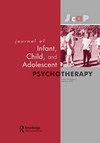捕捉父母心理化:有效措施所需要素的专家视角专题分析
Q3 Psychology
Journal of Infant, Child, and Adolescent Psychotherapy
Pub Date : 2021-04-03
DOI:10.1080/15289168.2021.1918044
引用次数: 3
摘要
父母心理化(parents Mentalization,简称PM)是指父母理解孩子内心体验的能力。它与儿童的发育有关,因为缺乏PM会导致不良的生活结果。PM措施评估父母心理化能力的质量,这可能会为干预和研究提供信息。然而,目前的测量方法受到使用复杂性和评估心理化多重特征的敏感性的限制。因此,了解PM测量中所需的基本元素是必要的,以便以生态有效的方式捕获PM,同时在日常实践中也可以实际管理。当前的研究旨在提供对如何最好地捕获项目管理的定性理解。具体而言,它旨在确定在临床和研究环境中使用的准确PM措施开发所需的基本要素。该研究报告了对五位项目管理领先专家的半结构化访谈数据。访谈采用专题分析进行分析。确定了三个主题:“捕获多个维度的广度和深度”,“捕获父母和孩子之间的自然交互”和“父母分析”。本研究强调了在选择或开发PM度量时应该考虑的基本要素。临床意义和进一步的研究措施的发展进行了讨论。本文章由计算机程序翻译,如有差异,请以英文原文为准。
Capturing Parental Mentalization: A Thematic Analysis of Expert Perspectives in Elements Required for Valid Measures
ABSTRACT Parental Mentalization (PM) refers to parents’ capacity to understand internal experiences of their children. It is linked with the development of children, as deficiencies in PM can lead to adverse life outcomes. PM measures assess the quality of parental mentalizing capacities, which may then inform intervention and research. However, current measures are limited by complexity of use and sensitivity to assessing the multiple features of mentalizing. Hence, understanding the essential elements required in PM measures is needed to capture PM in ways which are ecologically valid while also being practical to administer in routine practice. This current study aimed to provide a qualitative understanding of how PM may be best captured. Specifically, it aimed to identify essential elements necessary in the development of accurate PM measures for use in clinical and research settings. The study reports data from semi-structured interviews with five leading experts in PM. Interviews were analyzed using thematic analysis. Three themes were identified: “Capturing the breadth and depth of multiple dimensions,” “Capturing natural interactions between parent and child,” and “Parent profiling.” This study highlights the essential elements which should be considered when choosing or developing PM measures. Clinical implications and further research for measure development are discussed.
求助全文
通过发布文献求助,成功后即可免费获取论文全文。
去求助
来源期刊

Journal of Infant, Child, and Adolescent Psychotherapy
Psychology-Clinical Psychology
CiteScore
1.70
自引率
0.00%
发文量
37
 求助内容:
求助内容: 应助结果提醒方式:
应助结果提醒方式:


